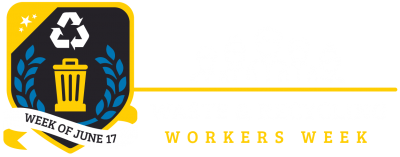JOLIET – Lots of stuff gets sorted out at the recycling center between the plastic, paper and glass – but not everything.
Cardboard contaminated by food remnants has to be thrown away. Plastic shopping bags that shouldn’t be in there have to be cut away from recycling machinery. Workers cutting away the plastic bags at times get stuck by syringe needles that shouldn’t be in there either.
And then there’s the occasional propane tank explosion.
Don’t throw your propane tanks into the recycling bin, said Tom Vojovic, director of recycling for Waste Management’s Illinois Missouri Valley Area.
“It seems obvious, but we get propane tanks every day, throughout the day,” Vojovic said. “That’s very dangerous for our employees.”
A lot of stuff gets thrown into recycling bins that shouldn’t, Vojovic said.
Jars coated with food, old blankets and even garden hoses are some of the things that get mixed in, contaminating recyclable materials that then have to be thrown away, Vojovic said.
“We want to be careful about what we put in curbside recycling because we want to get the most from what we recycle,” he said.
Waste Management has devoted a website to the to subject, which is recycleoftenrecycleright.com.
New Joliet program
Questions about what should and shouldn’t go into the recycling bins were among the most frequently asked by Joliet residents who attended a meeting in November to explain Waste Management’s new services in the city for 2018.
Waste Management is expanding recycling to once-a-week pickup in Joliet.
The company also will provide its At Your Door service, which collects electronics and hazardous waste materials upon request.
The hazardous wastes include the syringe needles that Vojovic said create real problems when they poke workers at the recycling centers.
John Jorgensen, a diabetic who needs to inject himself with insulin, said getting rid of used needles is a real problem and that he looked forward to using the At Your Door program.
“Nobody will take those around here,” Jorgensen told Waste Management representatives at the meeting. “What you guys are doing is great.”
Jorgensen does not throw away his needles, which Waste Management appreciates.
But Michael Morley, municipal marketing manager for Waste Management, said that when it comes to nonhazardous waste, the garbage can is an option if they question whether an item is recyclable.
“When in doubt, throw it out,” Morley said. “If you’re not sure, we’d prefer you throw the material away rather than throw something that’s not recyclable in the recycle container.”
Waste Management may begin trying to get the attention of Joliet residents who repeatedly recycle things they shouldn’t. Morley said such customers may see stickers on their containers warning them that their recycling habits have become a problem.
The problem goes beyond complications at the recycling center, Waste Management officials said.
Companies that buy recycled plastic and paper are becoming stricter about what they will accept, they said.
“We find a lot of food waste,” Vojovic said. “It contaminates the other commodities which makes them nonmarketable to a buyer.”
What can’t be sold becomes garbage, he said.
Vojovic listed the top five problem materials that get into the recycling bins.
• Plastic shopping bags: They can be recycled at stores that take them back and then send them off to specialized processing centers. But they only make a mess at the Waste Management center for curbside recyclables. “Because something is recyclable, it doesn’t mean it’s in the curbside program,” Vojovic said.
• Wrap-ables: Cords or blankets used to wrap other items clog machinery at the processing center, too. “Nothing in a recycling bin should be tied up,” Vojovic said.
• Food waste: Those cardboard pizza boxes are good only if they are not spotted with grease, and peanut butter jars need to be cleaned of all peanut butter if they are recycled.
• Syringes and needles: Workers at the recycling center who get stuck by them don’t know how they were used and will need follow-up medical attention, Vojovic said.
• Propane tanks: “If there’s any residual propane in the tanks and they make it to a bailer, they will explode,” Vojovic said.
Passionate about protecting our environment. Committed to being a learning resource. Our goal with The Recycle Guide is to provide you with relevant, accurate, and unbiased information about recycling. We believe that at the core of recycling is an individual’s choice. Your daily choice to reduce waste, reuse various materials, and recycle items instead of throwing them in landfills is what makes recycling programs work. Let’s get started learning and working together! http://www.recycleguide.org
